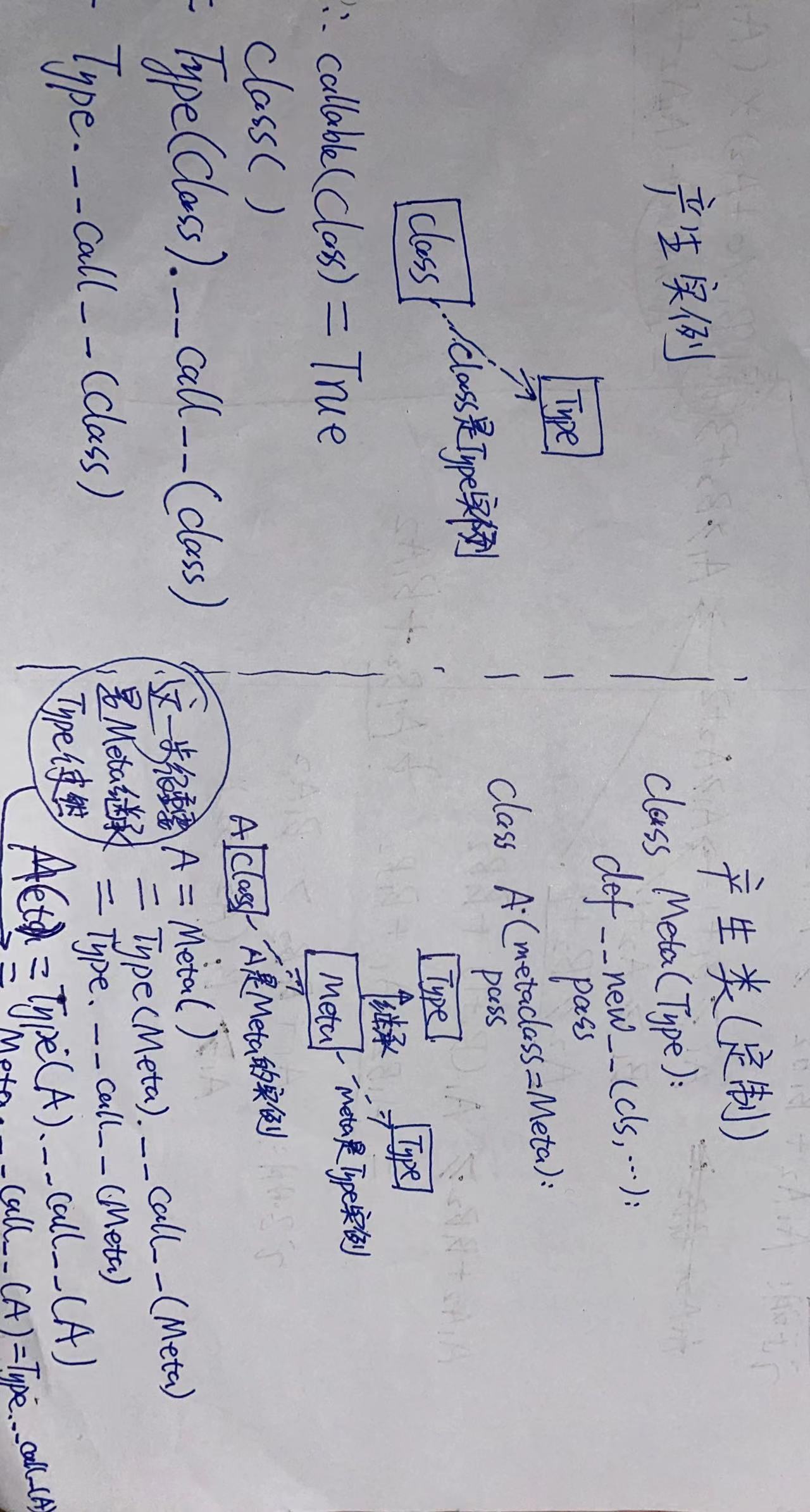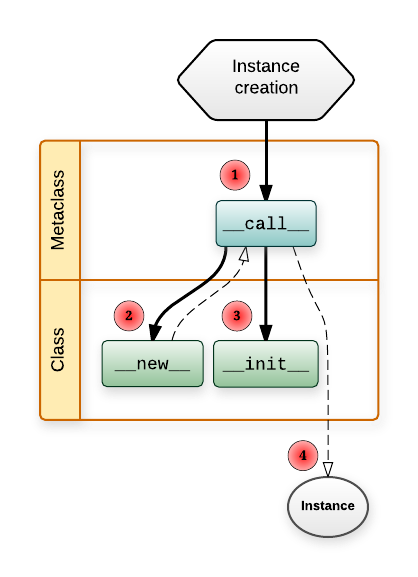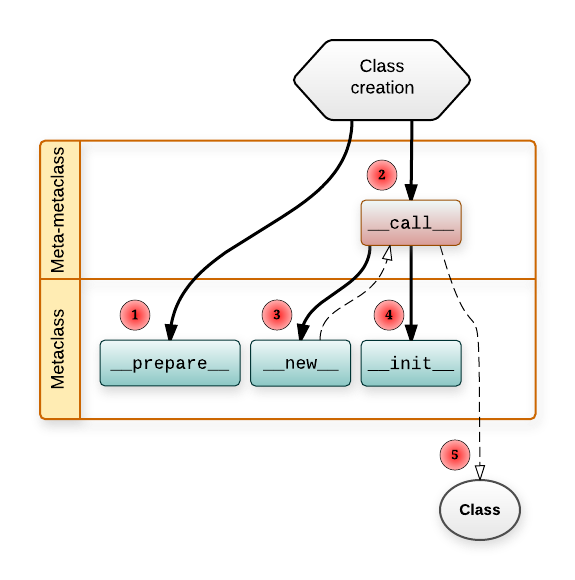Python Metaclasses
https://realpython.com/python-metaclasses/#type-and-class
Type and Class
typeis a metaclass, of which classes are instances. Just as an ordinary object is an instance of a class, any new-style class in Python, and thus any class in Python 3, is an instance of thetypemetaclass.In the above case:
xis an instance of classFoo.Foois an instance of thetypemetaclass.typeis also an instance of thetypemetaclass, so it is an instance of itself.
Defining a Class Dynamically
def f(obj):
print(\'attr =\', obj.attr)
Foo = type(
\'Foo\',
(),
{
\'attr\': 100,
\'attr_val\': f
}
)
x = Foo()
x.attr
x.attr_val()
等价于
def f(obj):
print(\'attr =\', obj.attr)
class Foo:
attr = 100
attr_val = f
x = Foo()
x.attr
x.attr_val()
Custom Metaclasses
class Meta(type):
def __new__(cls, name, bases, dct):
x = super().__new__(cls, name, bases, dct)
x.attr = 100
return x
class Foo(metaclass=Meta):
pass
Foo.attr
等价于
class Meta(type):
def __new__(cls, name, bases, dct):
x = super().__new__(cls, name, bases, dct)
x.attr = 100
return x
Foo = Meta(\'Foo\', (), {}):
Foo.attr
实例产生过程
class Foo: pass f = Foo()
The expression
Foo()creates a new instance of classFoo. When the interpreter encountersFoo(), the following occurs:
The
__call__()method ofFoo’s parent class is called. SinceFoois a standard new-style class, its parent class is thetypemetaclass, sotype’s__call__()method is invoked.That
__call__()method in turn invokes the following:
__new__()__init__()If
Foodoes not define__new__()and__init__(), default methods are inherited fromFoo’s ancestry. But ifFoodoes define these methods, they override those from the ancestry, which allows for customized behavior when instantiatingFoo.
https://blog.ionelmc.ro/2015/02/09/understanding-python-metaclasses/
类是元类的实例
类的实例的产生, 是依赖元类的 __call__ 接口, 并调用类的 __new__ and __init__
To start things off, a diagram of how instances are constructed:
How to read this swim lane diagram:
- The horizontal lanes is the place where you define the functions.
- Solid lines mean a function call.
- A line from Metaclass.__call__ to Class.__new__ means Metaclass.__call__ will call Class.__new__.
- Dashed lines means something is returned.
- Class.__new__ returns the instance of Class.
- Metaclass.__call__ returns whatever Class.__new__ returned (and if it returned an instance of Class it will also call Class.__init__ on it). [16]
- The number in the red circle signifies the call order.
类产生过程
class Meta(type):
def __new__(cls, name, bases, dct):
x = super().__new__(cls, name, bases, dct)
x.attr = 100
return x
class Foo(metaclass=Meta):
pass
Foo.attr
等价于
def new(cls, name, bases, dct):
x = super().__new__(cls, name, bases, dct)
x.attr = 100
return x
Meta = type(\'Meta\', (type), {\'__new__\': new})
Foo = Meta(\'Foo\', (), {})
为了生成Foo实例, 调用Meta类的call接口, Meta没有call接口, 则会向上找到type的call接口, 然后执行实例化过程,
进而调用 Meta的 __new__ 生成一个类,对应变量为x
Note that a custom
__new__()method has been defined forMeta. It wasn’t possible to do that to thetypemetaclass directly. The__new__()method does the following:
- Delegates via
super()to the__new__()method of the parent metaclass (type) to actually create a new class- Assigns the custom attribute
attrto the class, with a value of100- Returns the newly created class
按照如下文档翻译, Foo类产生的语句为
type(Meta).__call__(Meta, \'Foo\', (), {})
https://docs.python.org/3/reference/datamodel.html#object.__call__
object.__call__(self[, args...])¶Called when the instance is “called” as a function; if this method is defined,
x(arg1, arg2, ...)roughly translates totype(x).__call__(x, arg1, ...).
https://blog.ionelmc.ro/2015/02/09/understanding-python-metaclasses/
def new(cls, name, bases, dct):
x = super().__new__(cls, name, bases, dct)
x.attr = 100
return x
Meta = type(\'Meta\', (type), {\'__new__\': new})
Foo = Meta(\'Foo\', (), {})
结合如上代码,我们来理解下类创建的过程:
meta class == Meta
meta meta class == Type
Meta 类 跟一般类的差别在于, 其继承了Type类, 这样当Meta产生的类,则继承了Type类的__call__ 和 __new__ __init__ 接口,
这样Meta类也就是一个Type类的一个特例, call调用(Meta()), 产生实例为class, 这个class 也具有的call产生实例的能力。
Creating a class is quite similar:
Few more notes:
- Metaclass.__prepare__ just returns the namespace object (a dictionary-like object as explained before).
- Metaclass.__new__ returns the Class object.
- MetaMetaclass.__call__ returns whatever Metaclass.__new__ returned (and if it returned an instance of Metaclass it will also call Metaclass.__init__ on it). [16]
So you see, metaclasses allow you to customize almost every part of an object life-cycle.
形式化推导过程
参考
https://blog.ionelmc.ro/2015/02/09/understanding-python-metaclasses/

来源:https://www.cnblogs.com/lightsong/p/15974345.html
本站部分图文来源于网络,如有侵权请联系删除。
 百木园
百木园

